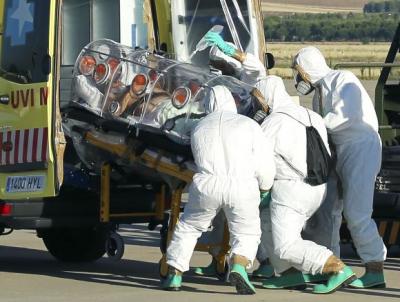Ebola: False Alarm, or the Poor Man's Atomic Bomb?

Ebola is familiar to Americans as the stuff of science-fiction horror novels, and is an ongoing real-life horror story in Africa. Viral hemorrhagic fevers, of which Ebola is one example, have killed fewer than 3,000 people over 40 years. So why the high level of concern now?
Is a worldwide breakout from the African epidemic a realistic possibility?
Dr. Thomas Frieden, director of the U.S. CDC (Centers for Disease Control and Prevention,) said on Aug 1 that an Ebola outbreak in the U.S. is "not in the cards," though he stated on Aug 7 that the disease would "inevitably" reach the U.S. The CDC has issued guidelines for commercial aircraft and hospitals, stating (as of Aug 8) that Ebola Is not spread through air, food, or water.
When transporting Ebola patients, however, CDC personnel don pressurized suits and self-contained breathing apparatus (SBCA)—a level of precaution well beyond the gloves, mask, and hand washing used by hospitals or emergency medical response teams. Is this just excessive caution?
The usual, natural mode of transmission requires direct contact, although there is evidence that air-borne transmission can occur in some circumstances, as noted in a Pathogen Safety Data Sheet from the Public Health Agency of Canada. In Africa, families handle corpses extensively in preparing them for burial, and medical workers often lack the most rudimentary protective gear. In rural areas, people live close to and often eat infected animals such as fruit bats and monkeys.
Unlike previous outbreaks, this one is occurring in major cities, with potentially devastating consequences discussed in an August 7 hearing before the U.S. House Foreign Affairs Subcommittee on Africa, Global Health, and Global Human Rights.
Some fears are based on concerns about potential deliberate use of deadly pathogens in biological warfare. Marburg virus, a relative of Ebola, was weaponized by the Soviets for aerosol distribution, as was smallpox. (Soviet efforts to weaponize Ebola were not successful.)
While chemical weapons have been called the "poor man's atomic bomb," biological agents are far more effective—and once released, they keep proliferating, unlike radioactivity or chemicals, which decay. They are one of the really big threats capable of causing mega-deaths, with trillions of dollars of economic impact and staggering blows to American civilization.
Whatever the source, epidemics like Ebola must not be viewed with complacency. Here are things the U.S. urgently needs to do, even if the current Ebola furor is a false alarm:
- Obtain a thorough travel and exposure history from anyone with symptoms that could be early Ebola (acute onset of fever, headache, muscle and joint pain).
- Develop and deploy technology for screening airline passengers, persons in public places, and others for early illness (body temperature, nitric oxide in exhaled breath, etc.). Thermal screening is quite feasible in airports and has been used to help contain influenza epidemics (in the long run probably a greater threat than Ebola). Enable use of non-approved, non-conventional therapy, and prioritize research.
- Upgrade response capabilities. There is said to be only one aircraft in the world with a level-4 chamber for transporting infected patients. The U.S. Aeromedical Isolation Team (AIT) was a casualty of the Obama military budget cuts.
- Focus intelligence and surveillance on likely threats, both natural and man-made.
- Secure the U.S. border, where children are being used as the equivalent of human shields to cover thousands of possibly sick or hostile entrants from many nations.
- Tell Americans the truth, and protect whistleblowers. Americans may assume that we are immune to or well protected from the societal chaos and diseases that are spreading through the world.
This is a prescription for a massive but preventable disaster. We need to treat Ebola as a wake-up call. Even if we discount any possibility of malicious intent, we need to remember the mega-deaths of the 1918 influenza pandemic.



























